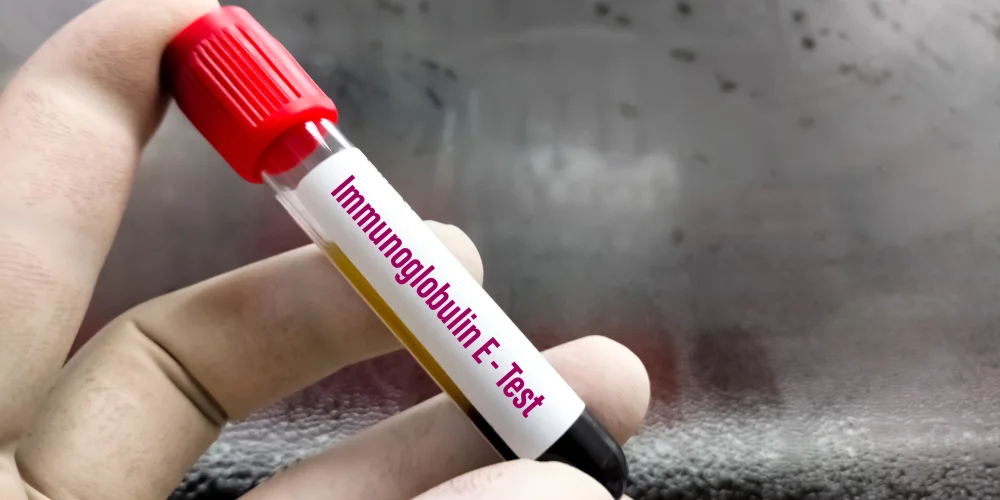Serum IGE Test
Assessment for Allergic Reactions and Conditions
It is the S.IGE Test is an instrument for diagnosing the level of Immunoglobulin E (IGE) antibodies in blood. IGE is an antibody created through the immune system when it is exposed to allergens, such as dust mites, pollen pet dander, and certain food items. The higher levels of IGE indicates that the body is affected by one or several of these allergens that can cause allergic reactions like sneezing itching, rashes, and asthma. It is the S. IGE Test helps in identifying specific allergic triggers and provides valuable information that can help in managing and treating allergic disorders efficiently.

When is the S.IGE Test Prescribed?
It is the S. IgE Test is recommended in many clinical scenarios:
- Diagnosis of Allergies : To determine if an individual’s symptoms are caused by an allergic reaction, and to determine which allergens are responsible.
- Assessment of Asthma : For individuals with asthma symptoms to evaluate if allergies are contributing to their condition.
- Evaluation of Chronic Allergic Conditions : To monitor and manage chronic conditions like allergic rhinitis or eczema.
- Pre-Surgical or Pre : Treatment Evaluation to identify allergies that could impact the outcome of surgery or treatment.
Preparation for the S.IGE Test
The process of preparing of preparation for the S. IGE Test is simple and doesn’t require any specific steps. Patients aren’t required to fast prior to the test There aren’t restrictions on food or drink consumption. However, it is essential to inform your healthcare professional about any supplements or medications that you are taking since they may affect the results of the test. Giving a complete medical history will ensure a precise analysis of the test results and assists your doctor to make informed decisions about the treatment you receive.
Parameters Considered During S.IGE Test
In an S. IGE Test, two crucial parameters are analyzed. Total IGE levels measure the overall amount of IGE antibodies in the blood, reflecting the body’s general immune response. Specific IGE levels identify the concentration of IGE antibodies related to particular allergens, helping to pinpoint the exact substances to which the patient is allergic. This dual analysis aids in diagnosing allergies and tailoring treatment strategies effectively.
Time Required for S.IGE Test Report
The S. IGE Test is typically quick and efficient. Blood samples are collected and sent to the laboratory for analysis. Results are generally available within a few days, depending on the laboratory’s processing times. This rapid turnaround allows for timely assessment of IGE levels and aids in diagnosing and managing allergic conditions.
S.IGE Test Price
The test is offered at Chirayu Super Speciality Hospital, the Serum Immunoglobulin Test is available at a cost of Rs.1100. This low-cost option offers vital information to diagnose and manage allergies, as well as allowing for individual treatment plans.
Book an Appointment for S.IGE Test
Making an appointment to schedule the S. IGE Test at Chirayu SuperSpeciality Hospital is easy and quick. It is possible to book your appointment online on our user-friendly website, or call our department to get assistance.
What Our Patients Say
Hear from our valued patients about their experiences at Chirayu Super Speciality Hospital and how our care has made a positive impact on their health and well-being.


Chirayu Hospital’s S. IgE Test was crucial in diagnosing my allergies and improving management.


The S. IGE Test at Chirayu provided detailed insights that greatly improved my health.


Effective and prompt S. IgE Test at Chirayu Hospital significantly improved my allergy management.


Chirayu Hospital’s S. IgE Test was precise and helped in adjusting my allergy medications.


The S. IgE Test results from Chirayu clarified my allergy issues and guided treatment.


Thanks to Chirayu’s S. IgE Test, I now manage my allergic reactions more effectively.
Frequently Asked Questions
Here, we provide answers to some of the most commonly asked questions to help you better understand our services, policies, and facilities. If you have any additional questions, please do not hesitate to contact us.
The S. IgE Test measures IgE antibodies in the blood to diagnose and manage allergic conditions and asthma.
A blood sample is drawn from a vein in your arm and sent to the laboratory for analysis.
No special preparation is required, but inform your healthcare provider of any medications you are taking.
Results are typically available within a few days, depending on the laboratory’s processing time.
Discuss the results with your healthcare provider to identify potential allergens and develop an appropriate treatment plan.